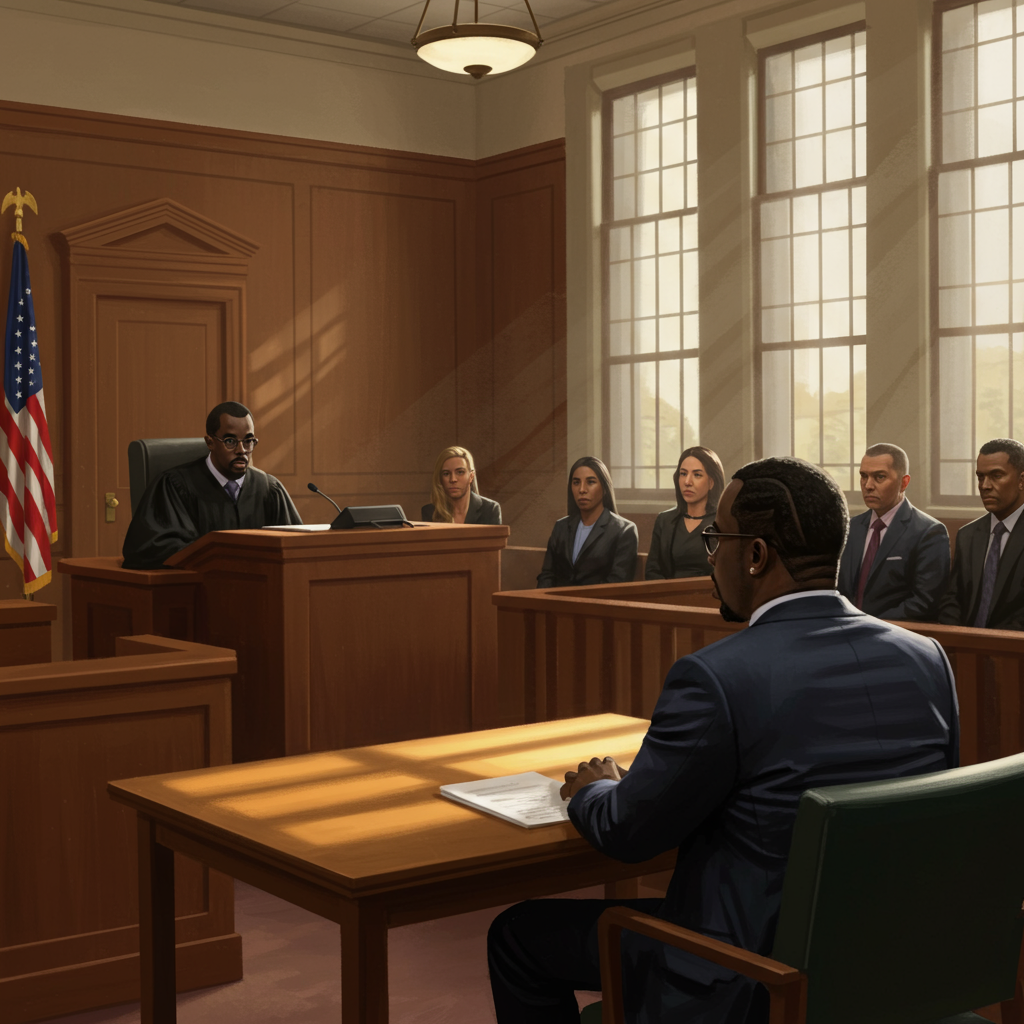The high-profile federal trial of Sean “Diddy” Combs is nearing a critical juncture, with the government wrapping up its case after weeks of compelling and often disturbing testimony. Combs faces grave charges, including sex trafficking and racketeering conspiracy, stemming from allegations that he orchestrated a criminal enterprise using his empire to facilitate and cover up various illegal acts.
Prosecutors have presented their case through a diverse group of more than 30 witnesses, including former girlfriends, employees, and federal agents. Their testimony aims to connect specific incidents and patterns of behavior directly to the complex federal charges leveled against the music mogul, who has pleaded not guilty to all counts.
Allegations of a Criminal Enterprise: Racketeering Conspiracy
The most sprawling charge is the racketeering conspiracy count, which carries a potential life sentence. Prosecutors allege Combs, aided by a small, trusted inner circle, conspired to commit and conceal a range of crimes, including sex trafficking, arson, bribery, kidnapping, drug distribution, and physical abuse. Key figures named in testimony, though not publicly charged in the indictment, include his chief of staff, Kristina Khorram, and head of security, Damion “D-Roc” Butler.
Witnesses have described alleged activities supporting this charge:
Facilitating Illegal Acts: Former personal assistants testified to stocking hotel rooms with illicit drugs, lubricant, and other supplies for multi-day events referred to as “freak-offs” or “hotel nights.” The government contends these events involved trafficking non-consenting women and paying male escorts.
Abuse and Intimidation: Several former employees and associates reported witnessing Combs abuse his girlfriends and experiencing his violence and intimidation tactics themselves.
Kidnapping and Arson: One former staffer, Capricorn Clark, alleged Combs kidnapped her twice. Rapper Kid Cudi also testified, corroborating an incident where Combs allegedly broke into his home in 2011 and attempted to blow up his car, purportedly out of anger over Cudi’s relationship with Cassie Ventura.
Bribery and Cover-Up: Central to the racketeering case is testimony from a hotel security guard, Eddy Garcia. Garcia recounted receiving $100,000 in cash from Combs in 2016 for security footage showing Combs assaulting Cassie Ventura. Prosecutors presented this payment as a bribe intended to bury evidence of criminal conduct and protect Combs’s reputation. Testimony from Combs’s former CFO also touched upon how his businesses handled money, which prosecutors link to facilitating alleged criminal activities.
Sex Trafficking Charges: Focusing on Alleged Victims
The indictment includes sex trafficking charges related to Combs’s former girlfriends, Cassie Ventura and an influencer/model identified as “Jane.” These counts focus on allegations that Combs coerced these women into engaging in commercial sex acts. Both women testified about “freak-offs” involving male escorts, often lasting days and fueled by drugs supplied by Combs or his associates.
Their accounts detailed how Combs allegedly dictated sex acts, watched, and sometimes recorded the encounters. They testified to feeling coerced into participating, citing his control, use of drugs to maintain compliance, threats to their careers (in Cassie’s case), and financial leverage (Jane received a monthly allowance). The government argues that the physical abuse Cassie suffered, documented in the 2016 hotel video, also served as a form of coercion. Both women alleged Combs later used recordings to blackmail them.
The question of why alleged victims remained in relationships despite the abuse was addressed during the trial, with expert testimony presented on the psychology of abuse. However, legal experts note that this remains a complex aspect for the jury, who must distinguish between coercion supporting trafficking charges and potentially toxic or consensual, albeit unorthodox, relationship dynamics.
Transportation for Prostitution: The Mann Act Counts
Separate counts relate to the transportation and use of male escorts during the alleged drug-fueled events, falling under the Mann Act. Witnesses testified about the recruitment and payment structure for male participants, who were allegedly paid significant sums depending on their “performance” under Combs’s direction in various locations worldwide. These charges specifically relate to the transportation and use of these “commercial sex workers” alongside the alleged victims.
Defense Arguments and Trial Dynamics
Combs’s defense team maintains his innocence on the most serious charges. They have argued that the encounters were consensual and that the alleged victims engaged in an “unorthodox sexual lifestyle” willingly. Through cross-examination, they have sought to challenge the credibility and motivations of government witnesses, suggesting some testimony stems from resentment or attempts to profit from civil lawsuits. The defense contends that any physical abuse, while regrettable, was part of a mutually toxic relationship, not evidence of sex trafficking.
As the trial draws to a close, legal observers have noted strategic decisions made by the prosecution, including the absence of certain witnesses like “Gina” (identified as Victim 3 in the indictment) and Kristina Khorram, despite testimony suggesting Khorram’s central role. While numerous A-list celebrities were mentioned by witnesses, few were called to the stand, a move legal experts suggest highlights the prosecution’s focus on establishing Combs’s alleged role as the head of a structured criminal enterprise under the RICO Act rather than relying on celebrity connections.
The federal indictment followed a series of civil lawsuits filed against Combs beginning in late 2023, many of which alleged similar patterns of abuse, sexual assault, and misconduct over decades. The leaked 2016 video footage showing Combs assaulting Cassie Ventura significantly amplified public attention and the severity of the allegations.
The jury now faces the challenging task of weighing weeks of often graphic testimony and evidence against the specific legal requirements of the complex federal charges. Legal experts emphasize the difficulty for jurors in separating the emotional impact of disturbing evidence from the objective application of the law to the facts presented.
Combs remains detained as the trial approaches its conclusion, with the severe charges and the breadth of the testimony painting a stark picture of the allegations before the court.


